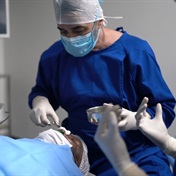People who are nearsighted may be nearly twice as likely to also develop glaucoma, a leading cause of blindness, according to a new study that summarises earlier research.
More than two million Americans over 40 have been diagnosed with the eye disease, which is becoming increasingly expensive to treat.
According to one expert, the findings mean nearsighted people - a third of all Americans - may want to undergo regular eye screening.
"A conclusion might be that persons with high myopia should have regular ophthalmic examinations," Dr Barbara Klein of the University of Wisconsin-Madison, who worked on one of the studies included in the new review, told Reuters Health.
Glaucoma is a group of eye conditions that damage the optic nerve, causing gradual loss of vision. There are several treatments available - including drugs and surgery - but none of them can restore sight once it's lost.
The study
The new study, published in the journal Ophthalmology, focused on the link between nearsightedness and "open-angle" glaucoma, the most common form of the disease.
Dr Nomdo Jansonius at the University Medical Centre Groningen in the Netherlands and colleagues combined data from 11 previous studies that included tens of thousands of people, tracking who were nearsighted and had glaucoma.
The researchers found that, overall, nearsighted people were about 90% more likely to also develop open-angle glaucoma. Those with higher levels of myopia appeared to be at higher risk of glaucoma, as well.
Co-occurrence
The findings only show that nearsightedness and glaucoma often co-occur, not that one causes the other. Furthermore, some of the studies are hard to compare, Klein noted, because they looked at people of different ages or ethnicities, or applied different diagnostic criteria for the conditions.
"The results are, in a sense, an average," she said, and may not be applicable to every group of people.
The American Academy of Ophthalmology already recommends regular eye exams for all adults, beginning around age 40. The group urges black people to start even earlier, with exams every three to five years, because their risk of glaucoma is higher.
The US Preventive Services Task Force, a federally supported expert panel, says there is too little evidence to recommend for or against screening. - (Alison McCook/Reuters Health, July 2011)
Read more:
Blindness stem cell clinical trial
Risk factors for glaucoma identified




 Publications
Publications
 Partners
Partners














